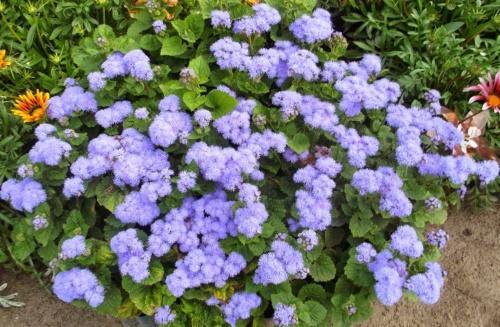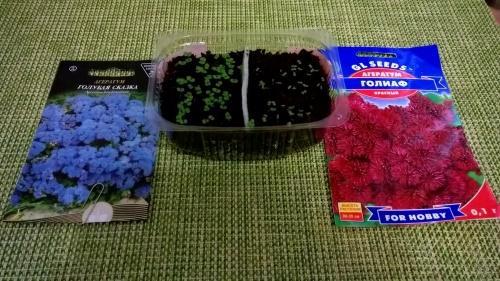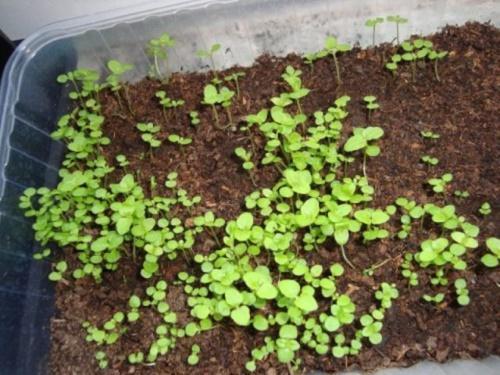How to plant ageratum - we grow long-flowered seedlings
 If you want your flower bed to look like a huge blooming ball, plant an ageratum. At first glance, these nondescript bushes do not represent anything special at first. The average plant height is 30 cm, erect stems are covered with toothed leaves of various shapes and light down. But when inflorescences begin to bloom among the foliage, you just can't take your eyes off this sight. Not only are the small flowers no more than 1.5 cm in diameter very delicate and look like fluffy pompons. There are still a lot of them: collected in inflorescences of several dozen pieces, they cover the entire bush with charming caps. But the most important advantage of a flower is the duration of flowering. Opening the first buds in early summer, flower caps last until the very frost, and inflorescences replace each other. There is nothing complicated in how to plant ageratum, no: it reproduces well by seeds. Crops germinate well, and the planting material itself can be stored for several years without losing germination. However, some features should be taken into account due to the heat-loving nature of the plant.
If you want your flower bed to look like a huge blooming ball, plant an ageratum. At first glance, these nondescript bushes do not represent anything special at first. The average plant height is 30 cm, erect stems are covered with toothed leaves of various shapes and light down. But when inflorescences begin to bloom among the foliage, you just can't take your eyes off this sight. Not only are the small flowers no more than 1.5 cm in diameter very delicate and look like fluffy pompons. There are still a lot of them: collected in inflorescences of several dozen pieces, they cover the entire bush with charming caps. But the most important advantage of a flower is the duration of flowering. Opening the first buds in early summer, flower caps last until the very frost, and inflorescences replace each other. There is nothing complicated in how to plant ageratum, no: it reproduces well by seeds. Crops germinate well, and the planting material itself can be stored for several years without losing germination. However, some features should be taken into account due to the heat-loving nature of the plant.
For long flowering ageratum is popularly called long-flowered.
Although ageratum is by its nature perennial, it cannot survive our winters. The culture is grown by annual planting in a flower bed. Moreover, tender young plants are very sensitive to spring frosts. Considering this, as well as the fact that the bushes will bloom not earlier than 2.5 months after sowing, ageratum is planted in seedlings.
Ageratum planting dates

If the spring is cold and late, it is better to sow ageratum in April and even in early May. However, flowering in this case will come later.
How to plant ageratum for seedlings?
 Since the seeds are very small, they are usually sown first in a common container, followed by picking into separate containers for growing. The planting process will not cause difficulties and is as follows:
Since the seeds are very small, they are usually sown first in a common container, followed by picking into separate containers for growing. The planting process will not cause difficulties and is as follows:
- Fill a shallow tray with light and nutritious earth. A universal substrate or a mixture of peat, sand and humus in equal parts.
- Spread the seeds over the soil surface.
- Sprinkle them lightly with soil without deepening.
- Cover with foil.
The seeds themselves do not need preliminary preparation. You can mix them with a little sand so that the small seeds lay evenly.
 After the emergence of seedlings, the shelter can be removed. Put the seedlings on a bright window and moisten the soil regularly. When a pair of true leaves has formed, dive the seedlings first into small cups. You can simply plant it in several containers to make the plants more spacious.Carry out the second pick when the seedlings grow up, already in separate pots. Ageratum is transplanted into open ground not earlier than the frost ends and stable heat is established. Usually this weather occurs at the end of May.
After the emergence of seedlings, the shelter can be removed. Put the seedlings on a bright window and moisten the soil regularly. When a pair of true leaves has formed, dive the seedlings first into small cups. You can simply plant it in several containers to make the plants more spacious.Carry out the second pick when the seedlings grow up, already in separate pots. Ageratum is transplanted into open ground not earlier than the frost ends and stable heat is established. Usually this weather occurs at the end of May.